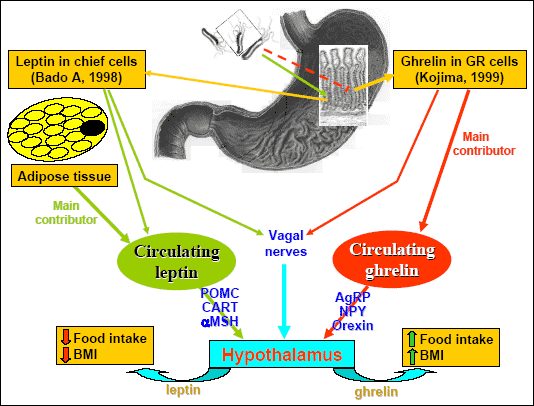 |
| Sleep Loss may equal weight gain- Sleep loss may be the cause of your weight gain. (according to the science of metabolism and sleep) Sleep more and lose weight.
I have been researching this topic for a quite while now, with interesting results.Sleep deprivation is often ignored by doctors and health practitioners. When people get less than 6-7 hours sleep each night, their risk for developing disease begins to increase. Lack of sleep is often neglected and can dramatically affect our abilities to do virtually everything, including exercise, weight loss. The relationship between the two is essential for good health. If you want to lose weight, experts say that you need to get enough sleep. In my research, I have found that woman who sleeps less than 5 hrs sleep a night weigh more than women who sleep 7 hrs sleep per night. Findings, presented at the 2006 American thoracic society international conference, showed that woman who sleeps 5 hrs per night were 32% more likely to experience major weight gain. 15% are more likely to become obese and over the course of the 16 yr study, compared to those who slept 7 hrs a night. This study included 70,000 middle aged women and was one of the largest studies to track the effects of sleep.The women were first monitored in 1986, and they reported their weight every 2 years for 16 years. at the start of the study the woman who slept 5 hrs or less per night weighed an average of 3 kgs more than those sleeping 7 hrs. they also gained an additional 2kg more over the next 10 years. I know that doesn’t sound like much but 8 kgs in 10 years is 16 kgs over a 20 year period. Some woman gained way more than that says lead researcher “Sanjay Patel” MD, assistant professor of medicine at case western reserve university in Cleveland, OH. Mentions that even a small difference in weight can increase a person’s risk of health problems, such as diabetes, hypertension, thyroid problems, and metabolism ….. Patel says during her research that she found after a few days of sleep restriction some woman showed that they became hungrier due to the hormone that controls their appetite. The hormone ghrelin and leptin both important hormones are important to regulate the appetite. and have been found to be disrupted by lack of sleep. So if you are interested in controlling or losing weight please pay attention to getting good night’s sleep. Sleep impacts many of the chemicals in your body including, serotonin; some people who have a deficiency in serotonin are more likely to suffer from depression. Sleeping can prevent depression by making sure you are getting the right amount of sleep, between 7-9 hrs each night. Sleep is a time for your body to repair damage caused by stress, ultraviolet rays and other harmful exposures. Your cells produce more protein while you are sleeping. these protein molecules form the building blocks for cells, allowing them to repair. Sleeping less affects changes in a person basal metabolic rate (the number of calories you burn when you rest) another contributor to weight regulation that has recently been scored is called non-exercise associated thermos genesis (involuntary activity such as fidgeting may be that if you sleep less, you move around less, and therefore burn up fewer calories Impact of sleep on cortical levels, lack of sleep can cause the release of additional cortical, the stress hormone and can stimulate hunger. Inadequate sleep interferes with the body’s ability to metabolize carbohydrates and cause high blood levels of glucose, which leads to higher insulin levels and greater body fat storage. Sleep loss also drives down leptin level, which causes the body to crave carbohydrates. Reduces levels of growth hormone- a protein that helps regulate the body’s proportions of fat and muscle. Can lead to insulin resistance and contribute to increased risk of diabetes, increased blood pressure, and increased risk of heart disease. We all need 6-9 hrs plus sleep daily. Lack of sleep may affect reaction time, memory, ability to reason logically, ability to handle stressful situations & your immune system. Some snap at their partners, family children, and often you’re less likely to exercise because you are too tired. I have had a few clients over the years that suffer from various sleep problems ranging from insomnia, trouble falling asleep and staying asleep, serious disorders, like chronic insomnia. Some of the cases of sleep loss are due to stress, pain, illness, smoking, depression, anxiety, unfamiliar beds, overweight, and caffeine. If you drink alcohol less than an hour’s before bed it makes you sleepy but interferes with later sleep. Vigorous exercise before bed within 3 hrs of bedtime will also disturb your sleep. VAN Caulter has spent 25 years doing research on the hormones that are affected by sleep. She said that sleep deprivation activates a small part of the hypothalamus, the region of the brain that also is involved in appetite regulation. Two critical hormones involved in regulating food intake -GHRELIN AND LEPTIN. THEY BOTH INFLUENCE EATING ID DIFFERENT WAYS. Ghrelin is an appetite releasing hormone released mostly but the stomach. When ghrelin levels are up people feel hungry. Leptin is considered a fullness hormone and is released by the fat cells and tells the brain about the current energy balances of the body. When leptin levels are high, this sends a message to the brain that the body has enough food and the person feels full. low levels indicate starvation and increase appetite. THESE HORMONES HAVE BEEN CALLED THE YING AND YANG OF HUNGER. ONE IS THE accelerator for eating (GHRELIN) and the other is the brain (LEPTIN). Nothing will help you lose weight if you do not reduce you kilojoules intake and increase your exercise. Do your best.increase your sleep to 7-8 hrs a night in bed sleeping should help you improve hormone function and may help you lose weight, coupled with exercise and dietary changes. Studies have shown that people who sleep less than four hours per night are 73% more likely to be obese than those who sleep between 7-9 hrs a night 4. if you sleep well in addition to improvements in your metabolism you will have enough energy to exercise. conclusion sleep diet and physical activity are recommended in the treatment related to modern living (e.g.: diabetes) call us today so we can help you balance your sleep loss and or weight gain 0412 526 383 How Exercise Can Affect Sleep Deprivation –Exercising has proven to be a great way to help with sleep deprivation.Exercise 2 hrs before bed leads to a fall in temperature a few hours later, which makes sleep easier . You may choose to exercise earlier in the day, like late afternoon, to give your body time to cool down, or hold off until the morning. In my experience the best time to exercise is in the morning as you system is sluggish after waking up and you will kick start your metabolism and burn fat. Instead of going for that coffee or cigarette break, try a brisk afternoon walk. It’s the easiest exercise in the world and all it takes is 20 minutes of your time. Or you could consider combining aerobic exercise with a weight training or resistance workout to help cure your sleep deprivation The Sleep And Exercise ConnectionAn exercise program not only helps people sleep better, it also encourages greater waking efficiency and becoming more alert. However, before starting exercise to sleep better, visit a doctor to develop an exercise program that works for you. Why not book one of our personal trainers to help you.
|



